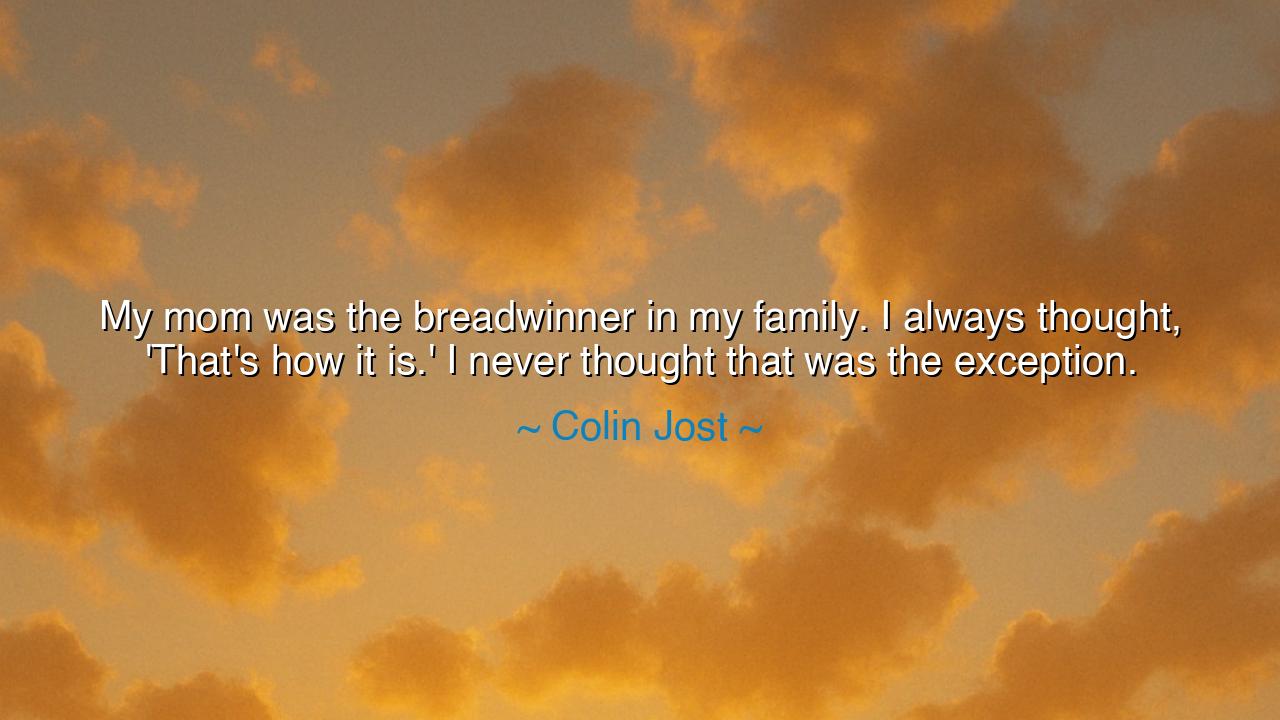
My mom was the breadwinner in my family. I always thought
My mom was the breadwinner in my family. I always thought, 'That's how it is.' I never thought that was the exception.






Hear the words of Colin Jost, who spoke not in jest but with reverence for the foundation of his life: “My mom was the breadwinner in my family. I always thought, ‘That’s how it is.’ I never thought that was the exception.” In these words lies more than a memory; it is a testament to the quiet strength of women who bore the weight of families, and to the innocence of a child who accepted such strength as natural. It is both a tribute and a revelation—that what the world might call unusual, he saw as ordinary, because love and labor were woven seamlessly together in his home.
The word breadwinner carries ancient weight. From the beginning of societies, to “win bread” has meant not only to provide food, but to secure survival, dignity, and continuity. That Jost’s mom held this mantle speaks to the reversal of traditional expectation. Where many saw the man as provider and the woman as keeper of hearth, here the roles were different, yet no less sacred. In the eyes of a child, there was no disruption, no exception—only the steady truth that the family’s strength was carried by a mother’s shoulders.
The ancients too knew such women. In the legends of Rome, there is the story of Cornelia, mother of the Gracchi brothers. When asked where her jewels were, she pointed not to gold or finery but to her sons, declaring, “These are my treasures.” She labored and sacrificed, not with sword or coin, but with wisdom and endurance, raising leaders who would one day challenge the corruption of Rome. She was a breadwinner of spirit, as Jost’s mom was of livelihood—both revealing the power of maternal devotion to sustain and shape the future.
Yet what is striking in Jost’s words is not merely his mother’s labor, but his unawareness that it was rare. As a child, he believed this was simply “how it is.” Therein lies a profound truth: children do not see social structures or norms, they see the reality before them. And in his reality, a woman providing for her family was natural, unquestioned, unquestionable. This reveals how the perspective of the young is free from prejudice, and how our earliest impressions can shape us to see strength where others expect weakness.
There is sadness in the fact that society calls such mothers “the exception.” For the work of women has long been hidden, underestimated, or dismissed, though in truth it has sustained families, cities, and nations. From the women who tilled fields while men went to war, to those who filled factories during times of crisis, history resounds with their labor. Yet too often they were erased from the tale, their sacrifices recorded as anomalies, their strength treated as rare. Jost’s words challenge this, reminding us that what is called exception is, in truth, far more common than acknowledged.
The lesson, then, is to honor the breadwinners of every kind, and not to bind them by expectation. Strength wears many forms—sometimes a father’s, sometimes a mother’s, sometimes shared between them both. What matters is not who provides, but the love that drives the sacrifice. We must teach our children, as Jost’s life taught him, that there is no single form of family, no single image of duty, but countless ways in which love ensures survival.
Therefore, let all who hear take this counsel: honor your mothers, for they may have borne burdens unseen. Do not think their sacrifices less because they were ordinary to you; the very fact that they seemed natural means they carried them so well you could grow without fear. And when you see families where women lead, do not call it strange or rare, but recognize it as another form of strength, as worthy as any other.
Thus the teaching endures: the breadwinner is not defined by gender, but by sacrifice. The exception is not the mother who provides, but the world that still struggles to honor her for it. Let us live with eyes open, as children do, seeing love as it is—powerful, selfless, and beyond division. In this way, we ensure that no act of devotion is diminished, and that the quiet labors of the past shine forth as the heroic truths they have always been.






AAdministratorAdministrator
Welcome, honored guests. Please leave a comment, we will respond soon